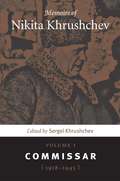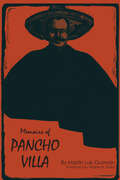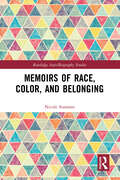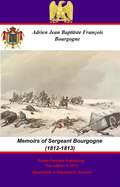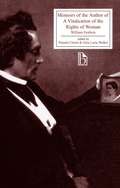- Table View
- List View
Memoirs Of Nikita Khrushchev: Volume 1 Commissar (1918-1945)
by Sergei Khrushchev George ShriverNikita Khrushchev’s proclamation from the floor of the United Nations that "we will bury you" is one of the most chilling and memorable moments in the history of the Cold War, but from the Cuban Missile Crisis to his criticism of the Soviet ruling structure late in his career the motivation for Khrushchev’s actions wasn’t always clear. Many Americans regarded him as a monster, while in the USSR he was viewed at various times as either hero or traitor. But what was he really like, and what did he really think? Readers of Khrushchev’s memoirs will now be able to answer these questions for themselves (and will discover that what Khrushchev really said at the UN was "we will bury colonialism"). This is the first volume of three in the only complete and fully reliable version of the memoirs available in English. In this volume, Khrushchev recounts how he became politically active as a young worker in Ukraine, how he climbed the ladder of power under Stalin to occupy leading positions in Ukraine and then Moscow, and how as a military commissar he experienced the war against the Nazi invaders. He vividly portrays life in Stalin's inner circle and among the generals who commanded the Soviet armies. Khrushchev’s sincere reflections upon his own thoughts and feelings add to the value of this unique personal and historical document. Included among the Appendixes is Sergei Khrushchev’s account of how the memoirs were created and smuggled abroad during his father’s retirement.
Memoirs of Pancho Villa (Texas Pan American Series)
by Martín Luis Guzmán&“A frequently fascinating and probably fairly accurate insight into the most controversial character of the Mexican Revolution.&” —Time Martín Luis Guzmán, eminent historian of Mexico, knew and traveled with Pancho Villa at various times during the Revolution. When many years later some of Villa&’s private papers, records, and what was apparently the beginning of an autobiography came into Guzmán&’s hands, he was ideally suited to blend all these into an authentic account of the Revolution as Pancho Villa saw it, and of the General&’s life as known only to Villa himself. This is Villa&’s story, his account of how it all began when as a peasant boy of sixteen he shot a rich landowner threatening the honor of his sister. This lone, starved refugee hiding out in the mountains became the scourge of the Mexican Revolution, the leader of thousands of men, and the hero of the masses of the poor. The assault on Ciudad Juárez in 1911, the battles of Tierra Blanca, of Torreón, of Zacatecas, of Celaya, all are here, told with a feeling of great immediacy. This volume ends as Villa and Obregón prepare to engage each other in the war between victorious generals into which the Revolution degenerated before it finally ended. The Memoirs were first published in Mexico in 1951, where they were extremely popular. This volume—translated by Virginia H. Taylor—was the first English publication. &“This biographical history presents as revealing a historical portrait of the Revolution as the author&’s earlier historical novel, The Eagle and the Serpent.&” —The Hispanic American Historical Review
Memoirs of Pancho Villa (Texas Pan American Series)
by Martv?n Luis GuzmánThis is a tale that might be told around a campfire, night after night in the midst of a military campaign. The kinetic and garrulous Pancho Villa talking on and on about battles and men; bursting out with hearty, masculine laughter; weeping unashamed for fallen comrades; casually mentioning his hotheadedness—"one of my violent outbursts"—which sent one, two, or a dozen men before the firing squad; recounting amours; and always, always protesting dedication to the Revolutionary cause and the interests of "the people." Villa saw himself as the champion, eventually almost the sole champion, of the Mexican people. He fought for them, he said, and opponents who called him bandit and murderer were hypocrites. This is his story, his account of how it all began when as a peasant boy of sixteen he shot a rich landowner threatening the honor of his sister. This lone, starved refugee hiding out in the mountains became the scourge of the Mexican Revolution, the leader of thousands of men, and the hero of the masses of the poor. Great battles of the Revolution are described, sometimes as broad sweeps of strategy, sometimes as they developed half hour by half hour. Long, dusty horseback forays and cold nights spent pinned down under enemy fire on a mountainside are made vivid and gripping. The assault on Ciudad Juárez in 1911, the battles of Tierra Blanca, of Torreón, of Zacatecas, of Celaya, all are here, told with a feeling of great immediacy. This volume ends as Villa and Obregón prepare to engage each other in the war between victorious generals into which the Revolution degenerated before it finally ended. Martín Luis Guzmán, eminent historian of Mexico, knew and traveled with Pancho Villa at various times during the Revolution. General Villa offered young Martín Luis a position as his secretary, but he declined. When many years later some of Villa's private papers, records, and what was apparently the beginning of an autobiography came into Guzmán's hands, he was ideally suited to blend all these into an authentic account of the Revolution as Pancho Villa saw it, and of the General's life as known only to Villa himself. The Memoirs were first published in Mexico in 1951, where they were extremely popular; this volume was the first English publication. Virginia H. Taylor, translator in the Spanish Archives of the State of Texas Land Office, has accurately captured in English the flavor of the narrative.
The Memoirs of Prince Max of Baden Vol. I (The Memoirs of Prince Max of Baden #1)
by Prince Max of Baden Baden W. M. CalderThis is Volume I of II comprising the authorized translation of Prince Max of Baden’s German memoirs published in 1927 (original German title: Erinnerungen und Dokumente). This translation was first published in 1928.“NOT long after the Revolution, when it became clear that an essential share of the blame for the German collapse would be ascribed to me, I decided to give a public account of my stewardship. I soon realized that I could only explain the actual connection of events both to the German people and to myself if I submitted the charges made against me to a careful examination, and also made up my mind to understand the point of view of my opponents.“As early as 1919 I found myself compelled to define my attitude to the disputed happenings of 9th November. I did this in a publication which was printed in all the newspapers but was virtually hushed up in the controversial literature.“In the study and self questioning of eight years I think I have got as near the truth as I can.“In the course of my work my apologia has grown into something different—an account based on original sources of that fateful epoch of the history of Germany in which I was involved. I put my trust in the weight of the facts.” (Prince Max of Baden)
The Memoirs of Prince Max of Baden Vol. II (The Memoirs of Prince Max of Baden #2)
by Prince Max of Baden Baden W. M. CalderThis is Volume II of II comprising the authorized translation of Prince Max of Baden’s German memoirs published in 1927 (original German title: Erinnerungen und Dokumente). This translation was first published in 1928.“NOT long after the Revolution, when it became clear that an essential share of the blame for the German collapse would be ascribed to me, I decided to give a public account of my stewardship. I soon realized that I could only explain the actual connection of events both to the German people and to myself if I submitted the charges made against me to a careful examination, and also made up my mind to understand the point of view of my opponents.“As early as 1919 I found myself compelled to define my attitude to the disputed happenings of 9th November. I did this in a publication which was printed in all the newspapers but was virtually hushed up in the controversial literature.“In the study and self questioning of eight years I think I have got as near the truth as I can.“In the course of my work my apologia has grown into something different—an account based on original sources of that fateful epoch of the history of Germany in which I was involved. I put my trust in the weight of the facts.” (Prince Max of Baden)
Memoirs of Race, Color, and Belonging (Routledge Auto/Biography Studies)
by Nicole StamantMemoirs of Race, Color, and Belonging provides a fresh look at the complex dialogue of race and identity in memoir, examining three generations of biracial African Americans’ experiences in their autobiographies. Exploring writers from James McBride and Shirlee Taylor Haizlip to Barack Obama, Toi Dericotte, Natasha Trethway, Rebecca Walker, and Emily Raboteau, this volume explores the ways in which these memoirists refute terms regarding race and simple understandings of belonging, using their contested embodied positions as sites for narration, quest, and protest. Organized chronologically, this volume will provide readers insight into memoirs from Jim Crow America to the Civil Rights period and finally those considering the post-soul (and post-Loving v. Virginia) generation. Memoirs of Race, Color, and Belonging interrogates these difficult spaces surrounding identity construction, encouraging new conversations surrounding visibility of mixed-race individuals and experiences for future generations. Through archives and personal testimony, this book provides a model for interweaving theoretical and personal accounts of color in American culture to encourage discussions that transgress disciplinary boundaries in the today’s dialogue.
The Memoirs of Sergeant Bourgogne (1812-1813)
by Anon Pickle Partners Publishing Sergeant Adrien Jean Baptiste François BourgogneThis ebook is purpose built and is proof-read and re-type set from the original to provide an outstanding experience of reflowing text for an ebook reader. Considered by the majority of commentators to be the quintessential personal narrative of Napoleon's disastrous 1812 campaign in Russia. The book charts the progress of the Grande Armée toward it's apogee at the occupation of Moscow, followed by the great fire of Moscow and the looting of the city to the terrible retreat. During the retreat the full horror of the hunger, privation are vividly depicted, not only in Bourgogne's own sufferings, but also those of his friends and countrymen. He stumbles through trials that proved too much for most those around him, whilst maintaining a haunting ability to describe the torments that try him. This account written partly in captivity in 1813, after capture at the battle of Dessau in 1813 and partly from letters he sent to his family during 1812, its historical significance and value cannot be over stated. Text taken from book published in 1899 by William Heinemann, London
Memoirs of the Author of A Vindication of the Rights of Woman
by William GodwinGodwin worked with Mary Wollstonecraft Shelley at the turn of the 19th century to advocate for social progress. In these, his memoirs, he reflects on that work as well as his and Shelley's various other passions. The work here was severely criticized at the time and long unavailable. Here, Clemit and Walker provide context, explication, and an introduction to Godwin's memoir.
Memoirs of the Court of St. Cloud, Volume 1
by StewartonThe present work contains particulars of the great Napoleon not to be found in any other publication, and forms an interesting addition to the information generally known about him.

